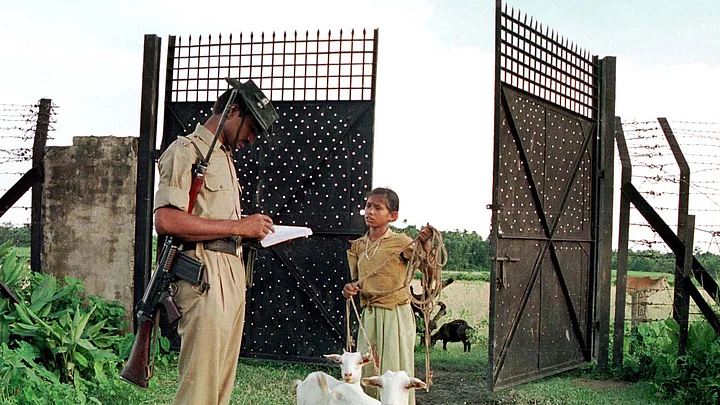Bangladesh was perhaps sceptical about the new government in India led by Prime Minister Narendra Modi after it swept to power in 2014. But as Modi completes a year in office, the new guard in New Delhi proved that the “neighbourhood first” policy that it had promised has begun to work. In the first week of May, the Modi government resolved a long-standing issue with Bangladesh, the ratification of the Land Boundary Agreement, for which Bangladesh had waited for long four decades.
Soon after its inking in 1974 by two the legendary leaders --Indira Gandhi and Sheikh Mujibur Rahman-- the Bangladesh JatiyoSangsad (parliament) quickly endorsed the LBA with India through the 3rd amendment to the constitution. Although delayed, the passing of the Constitution Amendment Bill in the Indian Parliament was a significant move as it paves the way for further strengthening of ties between the two neighbours.
A New Sense of Optimism
India-Bangladesh relations have seen many ups and downs. The assassination of Sheikh Mujibur Rahman in 1975 created a tremendous trust deficit between Delhi and Dhaka that perhaps took its toll on resolving some important bilateral problems. Given the post-1975 political scenario and the subsequent military regimes in Dhaka, including the protracted legal and domestic political wrangling in India, the LBA issue remained dormant.
The LBA ratification has aroused a sense of optimism and trust in Bangladesh today and will open up a new era in bilateral relations. Judging by reactions in Dhaka, the unanimous endorsement of the LBA is being seen as anaffirmation of India’s general attitude of friendliness towards Bangladesh. The ratification has also created a positive image of India.
Big Diplomatic Success
Prime Minister Sheikh Hasina hailed the LBA ratification as a “big diplomatic success” and also a “new milestone” in bilateral ties. The Bangladesh Nationalist Party (BNP), the second biggest party, and the Jatiya Party of Gen H M Ershad, have thanked India for the passage of the bill. National newspapers and opinion builders saw the development as a breakthrough in relations.
India’s relations with Bangladesh had already taken a distinctly positive course since Sheikh Hasina visited New Delhi in 2010, and Manmohan Singh paid a visit to Dhaka in 2011. It was due to a rebooting of ties that Bangladesh took affective measures against northeast India’s insurgency and agreed to be India’s partner in mutually supportive connectivity and important infrastructure initiatives.
India has also shown a similar gesture of goodwill by accepting international arbitration as a means to settle a maritime boundary with Bangladesh. The resolution of these issues shows that intractable matters can be dealt within the overall relationship of growing trust and friendship.
Geography and history have predestined that India and Bangladesh will be inseparable, and they, therefore, should remain close to each other for regional peace and mutual progress. For countries that share not just frontiers but also history and culture, greater people-to-people initiatives are an imperative.
Like the enclaves in Bangladesh and India, similar territorial oddities – about 50 – remain scattered across remote patches of Europe and Africa, but few have seen their citizens abandoned and left to despair as in the sub-continent. The LBA ratification therefore has a humanitarian element to it.
Relief For Enclave Dwellers
The people living in the 162 enclaves in India and Bangladesh have had no clear national identity. For 68 years, they have remained virtually stateless, enjoyed no basic amenities and facilities that normal citizens consider to be their right. But once the LBA is implemented, the enclave dwellers will have nationality and access to state benefits.
There are over 14,000 people living in Bangladeshi enclaves while Indian enclaves are home to more than 37,000 people. Once the enclaves are exchanged, the main challenge for the two governments will be rehabilitation of the people without any bureaucratic hassles. The LBA will also resolve the issue of territories in “adverse possession”. These patches of land account for 2,777 acres (921.47 hectares) under Bangladeshi possession and 2,267 acres (917.42 hectares) under Indian possession.
India Must Make The Next Move
It was particularly satisfying for Bangladesh that passage of the Constitution Amendment Bill has succeeded in building bridges. India’s political class was able to put behind internal differences to understand Bangladesh’s interests and needs, and in the same spirit that New Delhi had shown during 1971 liberation war.
While the LBA ratification has put Bangladesh-India relations on a higher trajectory, it is time to cross another hurdle – the Teesta water sharing dispute. Other minor, but niggling, issues also deserve early resolution. The wave of optimism created by the LBA must continue.
(At The Quint, we question everything. Play an active role in shaping our journalism by becoming a member today.)
